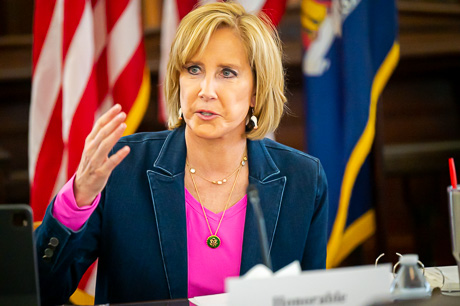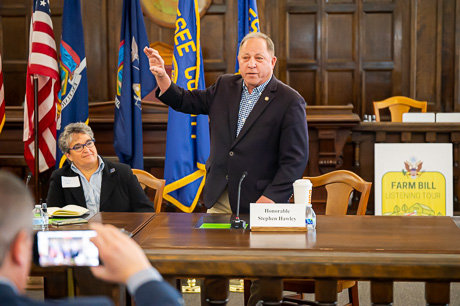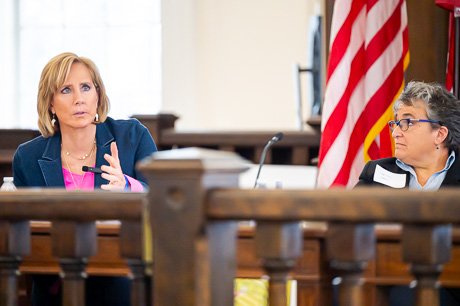Dairy prices and substitute labeling, crop insurance, support for specialty crops, soil health, nutrition programs, agricultural research, inflation, and invasive species were all topics that farmers in the region brought to Congresswoman Claudia Tenney Tuesday at the Old Courthouse in Batavia,
Tenney, who has been representing Genesee County as part of the redrawn NY-24 since January, made Batavia the first stop on a tour of the district to discuss potential provisions in the 2023 Farm Bill.
Congress passes a new Farm Bill every five years. The Farm Bill is most notably known for providing crop insurance and other assistance to farmers to deal with the nature-driven inherent risks of agriculture and the trade barriers that often make selling their commodities more difficult. But it also deals with a host of other issues related to farming.
While all of those topics were discussed, the topic most often broached by speakers on Tuesday was immigration. Farmers are tired of seeing their workers fear deportation, and they want to increase the labor supply to help them remain productive.
"I've been involved with immigration and immigration issues since the Reagan administration," said Kim Zuber, owner of Zuber Farms in Byron. "Our first Hispanic employee, back in 1980, the first kid we got was 21. He had a green card, and he became a citizen through the Reagan administration. I've been in Washington many, many times, and this is a political football by the left and right, and we pay the price. They practically make criminals of us on the question of papers. We are sick of being in the middle of this political football. We really would appreciate it if somebody would stand up and say, 'Enough.' These people are our fellow human beings. Sure, surely, bad people come across the border, but the people who work on these farms are supporting themselves and their families. They're good people. They got families and kids just like us. It's just sad. We are sick of being the football between the left and the right."
Natasha Sutherland, from Stein Farms in Le Roy, was the first speaker of the day and, after talking at length about dairy prices and the regulations that control them, opened the immigration discussion by noting that there are people entering the country on a daily basis, risking their lives, to provide for their families. Often these farmworkers are supporting families they left behind.
"These people deserve to live and work without fear of deportation," Sutherland said.
The next speaker, Pat McCormick, reiterated some of Sutherland's points.
"We need to improve," he said. "We need to be able to get the farmworkers that we need here and have the paperwork they need so that they're not afraid to go to the hospital and not afraid to go to the grocery store."
He added, "They are a vital part of our community and are a vital support to their people back home, so we need to fix that problem."
Another farmer spoke about one of his workers who witnessed a murder and was initially afraid to speak to authorities for fear of deportation. Eventually, he did provide evidence that helped get the killer convicted, but the farmer said farmworkers shouldn't have to face that kind of fear.
"It brings people to tears," he said. "These guys and girls are people. They're one of us. They deserve more respect than we give them."
Tenney Supports Immigration Reform
In her closing remarks, Tenney told the farmers she heard their concerns about immigration and is seeking to address it. In an interview with The Batavian after the meeting, Tenney said she supports providing a pathway for undocumented farmworkers to stay in the country without fear and that she would particularly like to help dairy farmers help their workers here on H2A visas stay in the country all year long. She also supports an increase in immigration from Mexico and South America so long as it's legal, protects the safety of Americans, and ensures farmers are getting workers who work hard and obey the laws of the country.
She acknowledged the need for more workers but said it's also essential -- especially in New York where farmers are facing increased costs because of new overtime rules and the threat of unionization -- to lower the costs for farmers to retain the workers they have.
"These visa programs are really just a bureaucratic disaster right now for them," Tenney said.
She explained, "What we're trying to do in the Farmworker Modernization Act is come up with a way to make (the H2A visa program) a year-round program, to make the touchback point, the consulate of (their home) country, which would be in New York State. That touchback would be to go and renew the visas and make it a more streamlined process. We would still go through all the criminal records. The farmers would be given some security as to the types of people that are coming to work in their operations. And it would provide us with some oversight as opposed to now, where we sort of have people in the shadows. We want to make sure good, hardworking people who are willing to come here, do the hard work, and that we can actually do it in a more streamlined fashion that is less cost costly to the farmers."
Asked about the fact that oftentimes Republican politicians oppose providing a pathway for undocumented workers to remain in the country, who are the kind of experienced workers farmers want to keep. Tenney said she is sympathetic to the frustration expressed by those views because she personally knows people who have waited 20 years to come into the country and become citizens through a documented, legal process.
But she also understands that people who came here to work and are working, are the kind of people we should want in the country.
"They're not coming here across the border to human traffic, to traffic drugs, to engage in surveillance," Tenney said. After accusing the Chinese of sending people to the U.S. to engage in surveillance, she continued, "We want to make sure that we provide a legal path so that the farmers are protected, the farmworkers are protected, and we know that the people who are working on these farms are productive and are no threat to American citizens in any way. They will ultimately at least have a path to legalization if they're not already legal."
Tenney is aware of the shortage of workers in the U.S. economy and understands the complexity around the issue of a large number of prime-working-age men not joining the labor force and said, yes, immigrants can help bridge that gap.
"We are seeing a great need, not just in farming, but across every sector," Tenney said. "We need people to come and work and create growth in our economy. Without growth, we're not going to deal with our deficits, we're not going to deal with the needs that we have."
While she supported the Farmworker Modernization Act, she thinks Republicans can and will come up with a better reform bill.
"Republicans are for allowing legal immigration," Tenney said. "We want the rule of law to be respected, and I think a lot of illegal immigrants don't know any better, to be honest with you, because they're being trafficked."
She blamed cartels for pushing illegal immigrants, including children, into the country in order to disrupt border security, even on the northern border.
"Nothing is more disheartening than my visit to the border and seeing just how much control the cartels have," Tenney said. "The confusion, the chaos, the large numbers coming across, the lack of ability for the Customs and Border Patrol to really handle this (is disheartening)."
There is a middle ground on immigration reform, she said, that doesn't involve lawlessness. There can be a sensible plan that respects the rule of law, and she believes that is what farmers are looking for.
Some economists project the U.S. is short about one million workers. Tenney said she isn't opposed to a million immigrants entering the company to fill jobs so long as it is legal.
"That's something that we have to negotiate, but I think there is a very few numbers of people who are against having more people come into the country legally," Tenney said. "There's a very small number that may think this is a burden on taxpayers. I look at (immigrants) as people who are going to produce growth, and if we're producing growth, and we have a larger output and more labor, you're going to see us prosper. We're going to be able to cut down our deficit and actually bring more prosperity. I see growth as the answer."
Photos by Howard Owens. Top photo: Rep. Claudia Tenney speaking during opening remarks.
Assemblyman Steve Hawley spoke briefly about the budget deadlock in Albany and how the deadlock is costing taxpayers money.
"They are intransigent," Hawley said. "They are refusing to do anything about bail reform or spending $240 billion a year of our taxpayer money. Every day that we were in Albany, 213 senators and assembly members cost you and me $40,000 a day. We've been there six days looking at not one budget bill, that's a quarter of a million dollars. Now, that pales in comparison to $240 billion, but a penny is a penny, and a dollar is a dollar, and there is a quarter of a million dollars being paid to individuals getting nothing done. It is tragic."
Natasha Sutherland, Stein Farms.
Seating in the Old Courthouse was nearly filled with farmers from throughout the region, most of whom did not speak during the meeting. Among those in attendance was Daniel Swyers, a dairy farmer from Perry.
While Tenney asks a farmer a follow-up question, County Legislative Chair Shelley Stein listens.
















































